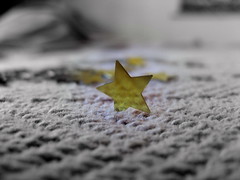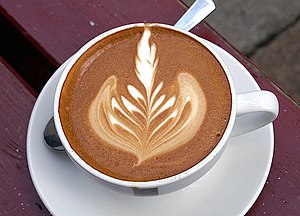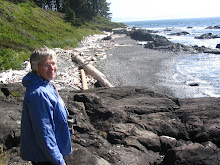 Image via Wikipedia
Image via Wikipedia
I think that using Google Reader to collect what I believe to be important is a way for me to avoid the tyranny of the urgent. I know the blog posts will be there for me to read when I have time. I can deal with them according to my own daily and weekly priorities.
Will Richardson discusses the reasons for collecting all the blogs that you wish to follow into one blog aggregator site (such as Google Reader). 1) Unlike an email account, you will receive no spam on your Google Reader account. Everything you receive there is something you have subscribed to. 2) Since everything comes directly into one location, it is easier to read through many sources of information. 3) If you subscribe to a topic or subject search, Google Reader will bring you anything new that is published on that subject. I think that with RefWorks (the tool I use to keep academic references for me), I also have this capacity to request new journal articles that have been published in my areas of research. 4) Will uses Google Reader to guide him in his professional development journey. (Richardson, 2009) I like this idea. I would like to know
 Image by communista_unicorn via Flickr
Image by communista_unicorn via Flickr
As Will skims and scans the 60 to 80 reads that he subscribes to, he meta-tags those he wants to keep. Google Reader places those feeds into folders according to those meta-tags. Later he can return to read those items in the folders. Another option is to star items which will then be kept in the Starred Item location. Later on, you can return to these items to reread them when you have more time.
Will suggests that if you will be off-line for a while, you can download all of your unread Google Reader items so you can read them away from your internet connection. Download Google Gears at http://gears.google.com/ in order to do this type of off-line reading. Some of us who have been on holidays this summer, could have used this application on our laptops. We could have been catching up on our Google Reader reading while traveling the highways. If you go to this website, you can get Google Reader on your mobile phone. Some people suggest that this is the way they keep up with reading the blogs they subscribe to. They can quickly skim and scan through the blog titles on their mobile phone.
 Will Richardson (2007) discussed his use of Google Reader as a type of textbook for himself. He goes to Google Reader and Twitter first thing every morning (but does he eat breakfast first?). He goes back several times each day. He finds that his daily learning process begins and continues with the flow of information from these two sources. He finds that Google Reader "changes the traditional information structures in fundamental ways, and it forces us to be much more involved with the information we consume. I’m no longer just a reader; I’m an editor who is constantly at work in the process of finding feeds to read, determining what’s relevant, trying to connect ideas and patterns, making decisions as to what to do with all of the information I come across." (Richardson, 2007) Will continues to ask questions about his use of Google Reader. These questions would be useful for our consideration as well:
Will Richardson (2007) discussed his use of Google Reader as a type of textbook for himself. He goes to Google Reader and Twitter first thing every morning (but does he eat breakfast first?). He goes back several times each day. He finds that his daily learning process begins and continues with the flow of information from these two sources. He finds that Google Reader "changes the traditional information structures in fundamental ways, and it forces us to be much more involved with the information we consume. I’m no longer just a reader; I’m an editor who is constantly at work in the process of finding feeds to read, determining what’s relevant, trying to connect ideas and patterns, making decisions as to what to do with all of the information I come across." (Richardson, 2007) Will continues to ask questions about his use of Google Reader. These questions would be useful for our consideration as well:
"What’s my optimum number of feeds to read? I’ve gone between 25 and 250, and now at about 60 I’m still not sure if that’s the “right” number. And it’s not just a time factor that determines that number, although that has more to do with it than anything else. T

How do I not become “married” to the feeds I already have? It would be easy to keep the 60 or so feeds that I have for a long time, but I’m not sure that’s the best strategy. As new voices appear, as my interests shift, I need to be willing to let some old voices go. That’s exceedingly hard, at times, because I don’t want to miss anything, and because I feel connected to those teachers on many levels.
Do I rely too much on a handful of feeds? I’ll admit, while I struggle reading every feed every day, there are a half dozen or so that I try not to miss. I think of these as the ones that do the best job of culling out the important ideas of the day. In many cases, these people are reading many of the same sources I am. I wonder if this makes it even more difficult to read more widely.
How many individual pieces of information can I realistically make sense of? There are days when I could easily find 50 or so interesting, relevant posts or links to sites, and I wonder if that’s always such a good thing. If I were to try to process all of that, will the best filter up?
How do I best organize the information that is most useful? I have a del.icio.us account, and I stow away some snippets of things in various spots. I tag and tag and tag. But this is my most difficult struggle. I’ve yet to find a really effective way of processing all the ideas and links that make it easy to return to later.
Should I read ideas, or should I read people? Stephen Downes advocates for the former, and I can understand why. It’s the concept, the exchange of ideas that is important, not the person so much. Still, I find it very difficult to separate the two, and I do think that knowing the person through the writing adds context to the ideas. But, again, reading people also tends to limit the scope and diversity of the ideas, I think." (Richardson, 2007)
Will continues to struggle with the idea of reading for diversity of thinking and even reading those bloggers whose ideas grate upon him. In a blog post in January of 2009, he
 Image via Wikipedia
Image via Wikipedia
Will suggests using PageFlakes with students or children to help them to begin to collect the information and reading for the content areas of their interest. He has even done this with his own children.
Mack Male discusses the concept of hyperlocal news. A new wikipedia on hyperlocal content has been created. Hyperlocal content "refers to entities and events that are located within
Image via Wikipedia
"I think there’s a place for aggregators and curators in the hyperlocal ecosystem. Perhaps another defining characteristic of hyperlocal content is that it is spread all over the place. Aggregators and curators can sift through all of that content to help make it more discoverable." (Male, July 31 2009) I'm not sure whether the aggregators of this hyperlocal content would be technology based or would be people who would search for and meta-tag local content so that others can discover it. I would be very interested in reading hyperlocal content from my city of Saskatoon (picture of Saskatoon bridge at night). This could be people's blogs, websites, Twitter posts, wikis, and nings that have been set up. Maybe I will try to use Saskatoon as a search term on Google Reader and see what comes up.
T Feeder: Top Technology Stories at http://www.tfeeder.com/ is a site that brings together the blog posts that are receiving the most retweets or comments. It shows which stories are boiling, hot, warm, or cold. What comes first: Internet or Breakfast? is a boiling story right now. Here is the link (http://mashable.com/2009/08/10/internet-vs-breakfast/). As I look down the list, I see that Mashable is the blog location for many of these stories. I guess I should put that on my Google Reader subscription list. It looks as though T Feeder has other options which I will have to check out later.
Bloglines was a type of blog aggregator in the past. A recent blog post at TechCrunch shows that Bloglines has not kept up with the times and is on life support at this time. People are better off going with Google Reader. This blog post also suggests that readers have left Google Reader so that they receive reading suggestions directly from Twitter, Friend feed, and Facebook. I would have an issue with this approach. The reading suggestions made to you would be based on the reading that your friends or those you follow on Twitter are doing. They may miss things that I consider important. I will continue to use Google Reader.
Iain Cook-Bonney commented on Richardson's blog post (2007) that as he uses Google Reader, he wonders: "Who do you listen to? How long do you listen to them for?" Cook-Bonney continues by saying: "RSS has indeed become my textbook, and more and more I am finding that my blog has become my 'margin' where I jot down my notes and thoughts." (Richardson, 2007)
 Image via Wikipedia
Image via Wikipedia
As we continue our use of Google Reader and other forms of RSS feeds, who are we listening to? How are we keeping track of our reflections as we read? And are we reading before or after that first cup of coffee?
References:
Hyperlocal. On Hyperlocal wikipedia page. Online at http://en.wikipedia.org/wiki/Hyperlocal
Male, M. (31 July 2009). Friday musings on hyperlocal news. On Mastermaq's blog. Online at http://blog.mastermaq.ca/2009/07/31/friday-musings-on-hyperlocal-news/
Richardson, W. (2009). Blogs, wikis, podcasts, and other powerful web tools for classrooms. Thousand Oaks, California: Corwin Press.
Richardson, W. (12 Jan 2009). De-Echoing My Reading Practice. . .Help Wanted. In Weblogg-ed. Online at http://weblogg-ed.com/2009/deechoing-my-reading-practice/
Richardson, W. (06 Aug 2007). Aggregator as textbook. In Weblogg-ed. Online at http://weblogg-ed.com/2007/aggregator-as-textbook/
![Reblog this post [with Zemanta]](http://img.zemanta.com/reblog_e.png?x-id=f85ed6ab-f951-4b09-913b-2e61db9cc0f5)





Hi Ruth,
ReplyDeleteI appreciate your struggle with keeping track. We have seen how all consuming this can become. I hadn't considered how we may fall into the habit of following people vs ideas.
But just today I commented on a blog I am following for the first time ever. What prompted me was when he said..okay everyone, this is not about education but about life. While others may have passed his post by, I zoomed in and loved his comments. So I commented back.
SO sometimes it IS the person that reels us in.
But that is just how I work in real life too!
Love your graphics..always so nice and crisp.
SJ
Thanks Shirley,
ReplyDeleteI think what seems to work well for me is to follow people who have great ideas.
Congratulations on commenting on someone's blog outside of our classmates. Something I read today suggested that this is a good way to build into the community of learners who will also track back to find out what you are saying on your blog as well.
Ruth
Hi Ruth,
ReplyDeleteI always enjoy reading your blog. You do such a good job of letting us into what you are thinking and doing and thinking about doing! Being able to get the latest hyperlocal content would be great. I wonder if there is such a thing in the PA area? I'll have to do some checking. How did you make out searching for Saskatoon?
Thanks - Carol =)
Hi Carol,
ReplyDeleteThanks for the kind comments.
I found a site that let me register as a Saskatoon-based blog and a Saskatoon-based Twitter account. Most of the Saskatoon blogs that I checked were the "report of the mom on toddlers" type of blog. If I were related to the toddlers, I would love these blogs. Since they are strangers, not so much. I am still looking for local bloggers that I would like to follow.
Good luck with P.A. If you find any great bloggers, let me know. I will follow them.
Ruth